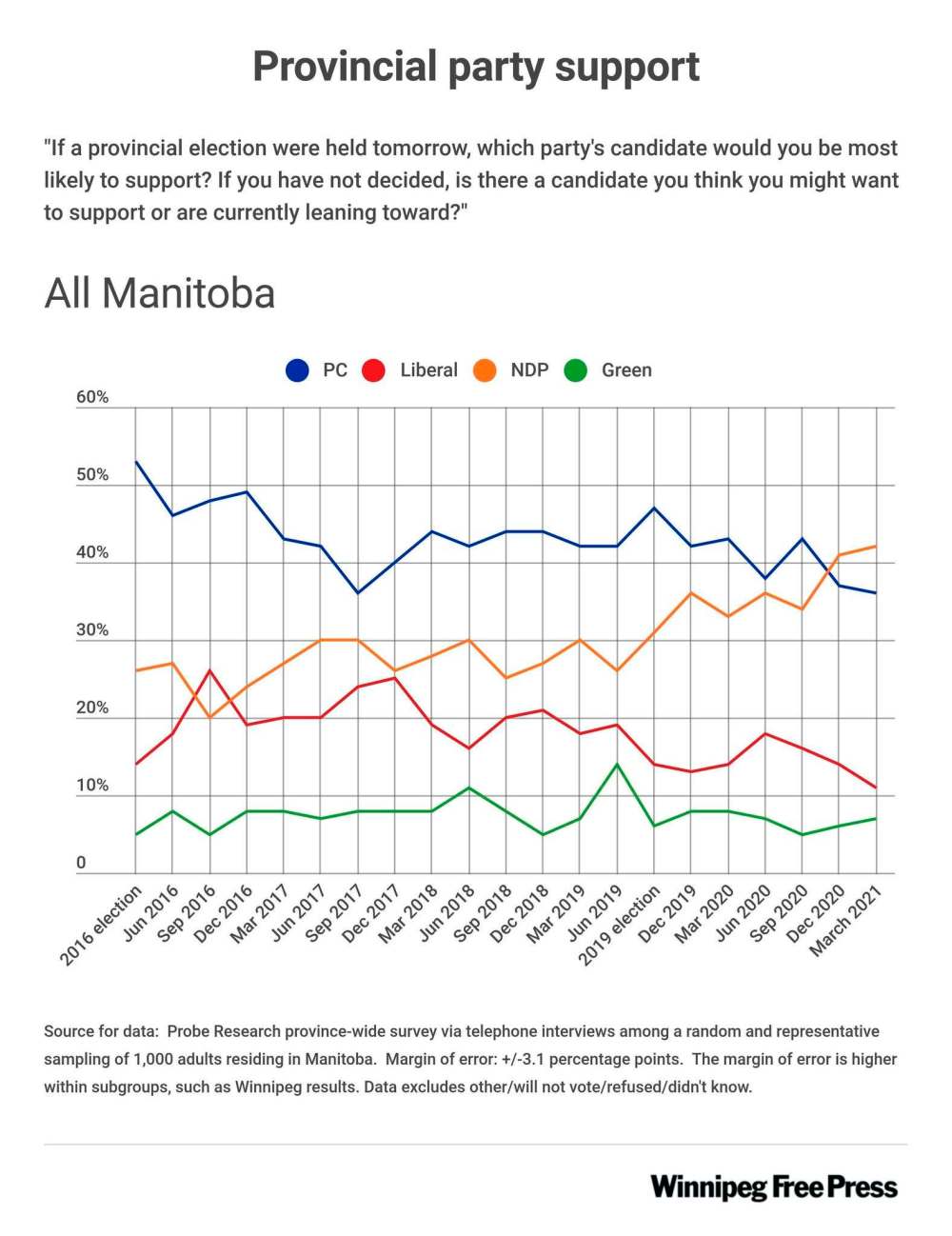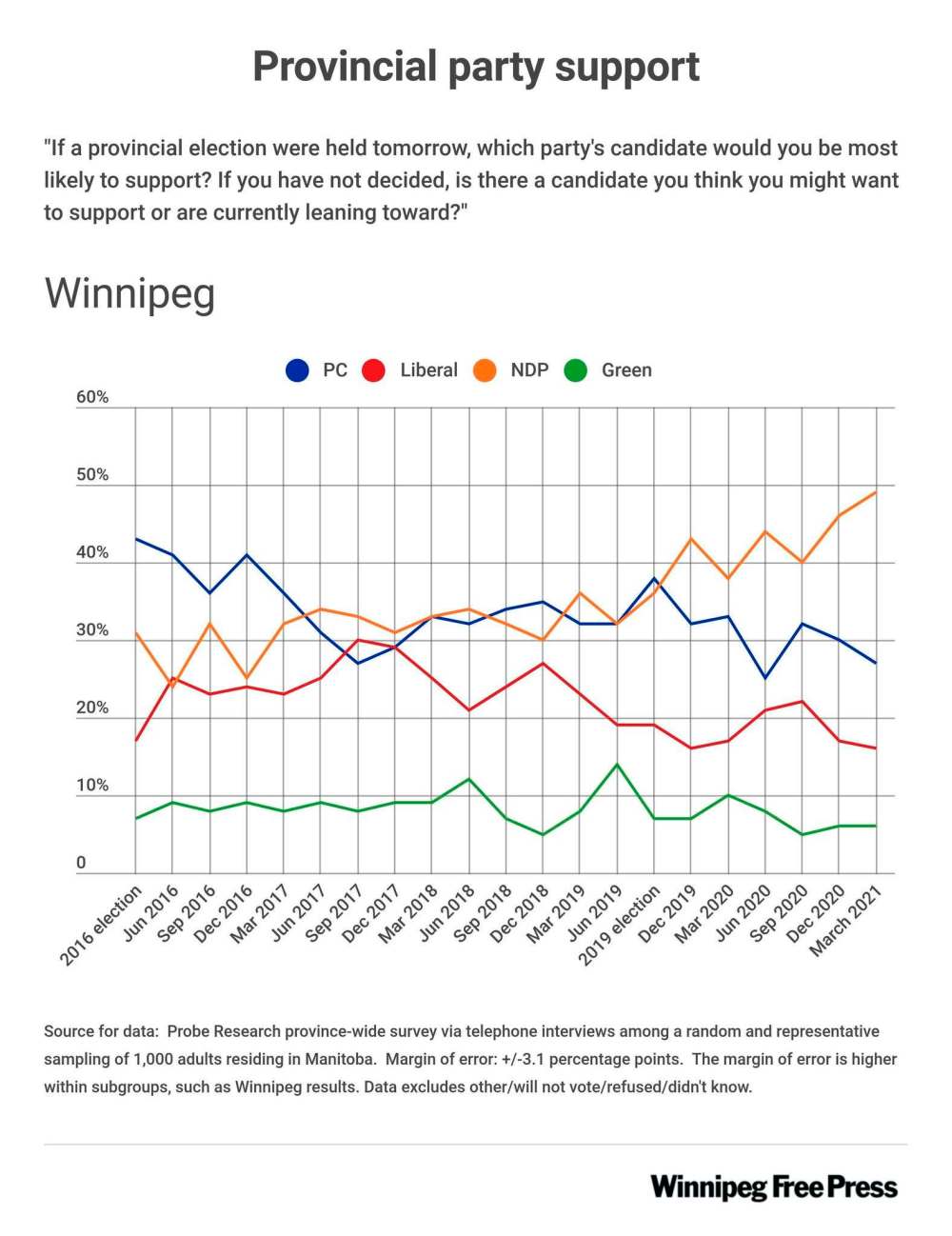Manitoba Tories would be kicked to curb, if election held tomorrow Probe poll shows governing party loses grip -- even on strongholds
Read this article for free:
or
Already have an account? Log in here »
To continue reading, please subscribe:
Monthly Digital Subscription
$0 for the first 4 weeks*
- Enjoy unlimited reading on winnipegfreepress.com
- Read the E-Edition, our digital replica newspaper
- Access News Break, our award-winning app
- Play interactive puzzles
*No charge for 4 weeks then price increases to the regular rate of $19.00 plus GST every four weeks. Offer available to new and qualified returning subscribers only. Cancel any time.
Monthly Digital Subscription
$4.75/week*
- Enjoy unlimited reading on winnipegfreepress.com
- Read the E-Edition, our digital replica newspaper
- Access News Break, our award-winning app
- Play interactive puzzles
*Billed as $19 plus GST every four weeks. Cancel any time.
To continue reading, please subscribe:
Add Free Press access to your Brandon Sun subscription for only an additional
$1 for the first 4 weeks*
*Your next subscription payment will increase by $1.00 and you will be charged $16.99 plus GST for four weeks. After four weeks, your payment will increase to $23.99 plus GST every four weeks.
Read unlimited articles for free today:
or
Already have an account? Log in here »
Hey there, time traveller!
This article was published 30/03/2021 (1720 days ago), so information in it may no longer be current.
The NDP has hung on to its lead provincially and overtaken the governing Progressive Conservatives in vote-rich Winnipeg, including battleground constituencies and Tory strongholds.
Not since the “heyday” of premier Gary Doer has the NDP led in the polls throughout the entire city, says Probe president Scott MacKay about the firm’s latest survey.
“If there were an election tomorrow, the Tories would be thrown out of office,” the pollster said Tuesday.
The opposition’s lead over the PCs provincewide has expanded to six percentage points, with 42 per cent of Manitobans saying if an election were held tomorrow, they’d vote for or were leaning towards a vote for the NDP, compared with 36 per cent who’d vote PC. The survey of 1,000 adults in Manitoba was conducted from March 10 to 26.
“It’s the beginning of a trend,” said MacKay. In December, for the first time since the 2016 provincial election, the NDP led the PCs in the province.
An earlier Probe survey conducted from Nov. 24 to Dec. 4 showed the NDP ahead of the Pallister government by five percentage points. In Winnipeg, where many election campaigns are won or lost, the NDP pulled even further ahead. The opposition party’s advantage over the PCs has grown to 22 points from its 16-point lead in December.
The Probe Research Inc. survey of a random and representative sampling of 1,000 adults in Manitoba was conducted from March 10 to 26. The survey results are plus or minus 3.1 percentage points of what they would’ve been if the entire adult population had been surveyed with 95 per cent certainty.
The number of undecided voters in Manitoba rose from 11 per cent in December to 17 per cent in March, which Probe president Scott MacKay said isn’t significant when an election is a year or more out.
The latest polling numbers indicate that the strong Winnipeg showing by the NDP in December was not a “blip,” said Christopher Adams, adjunct political studies professor at the University of Manitoba. In fact, the NDP pulled even further ahead.
“It really shows in Winnipeg the (Progressive) Conservatives are continuing to decline,” Adams said.
The party has dropped from 32 per cent support in Winnipeg in September, to 30 per cent in December, to 27 per cent in March. With the city and surrounding area home to the majority of the population — and 32 of the legislature’s 57 seats — the NDP would have a majority if an election were held tomorrow, said Adams.
Among rural Manitoba voters, the PCs — who usually win rural seats by huge majorities — have 50 per cent support compared with 32 per cent for the NDP. But winning all the races outside Winnipeg and its bedroom communities can only get the Tories 25 of the 57 seats.
The NDP’s growing citywide lead in the polls — including places where Tories would traditionally lead – the southwest, southeast and parts of northeast Winnipeg — hasn’t been seen in more than a decade, said MacKay.
“I think we would have to go back to the heydays of the Doer government — to the elections of 2003 and 2007 — when they won so handily,” MacKay said.
“The battles really are won or lost in the city,” said MacKay. “These urban and suburban Tories should be worried.” While the Tories have an 18-point lead in rural constituencies, “the city is not working for them, these days,” he said.
Women are the other reason the NDP is surging ahead of the PCs, figures Adams.
“In survey data across Canada, people have noticed that women are more sensitive to social and community issues,” the political studies professor said. “There’s more of a tendency to be concerned with social and community issues in a pandemic,” he said. “Women are more sensitive to schools, what’s happening in seniors homes and losing jobs disproportionately (compared to men),” Adams said.
In Manitoba, 48 per cent of women support the NDP compared to 26 per cent of women who’d likely vote PC.
The fate of the NDP in Manitoba and Saskatchewan is tied to female voters, said Adams. If the NDP has the support of women, the party takes power.
“When that advantage disappears, the NDP lose,” he said. In the 2016 election, when he beat NDP premier Greg Selinger, Brian Pallister “softened his image in the media,” Adams observed. The PC leader, who wore sweaters as he campaigned outside hospitals and schools, won the election. Support from women has withered since the PCs formed government five years ago.
When asked to comment on the latest Probe poll results Tuesday, the government’s director of media relations declined.
Opposition NDP Leader Wab Kinew said he thinks the PC government’s handling of COVID-19 is a big reason Manitobans are leaning toward the NDP.
“I think people across the province looked at the government during the pandemic and found a lot of mistakes and a lot of the wrong priorities being emphasized by the PCs,” Kinew told the Free Press Tuesday.
“I think that we focus on a lot of issues that matter to people across the province — health care, education, hydro — the stuff we’re focusing on is relevant to those folks.” The NDP leader said he doesn’t want to “downplay” or “over-exaggerate” poll results.
“The reality is we have a ton of work to do as the NDP to form the next government.”
carol.sanders@freepress.mb.ca

Our newsroom depends on a growing audience of readers to power our journalism. If you are not a paid reader, please consider becoming a subscriber.
Our newsroom depends on its audience of readers to power our journalism. Thank you for your support.








